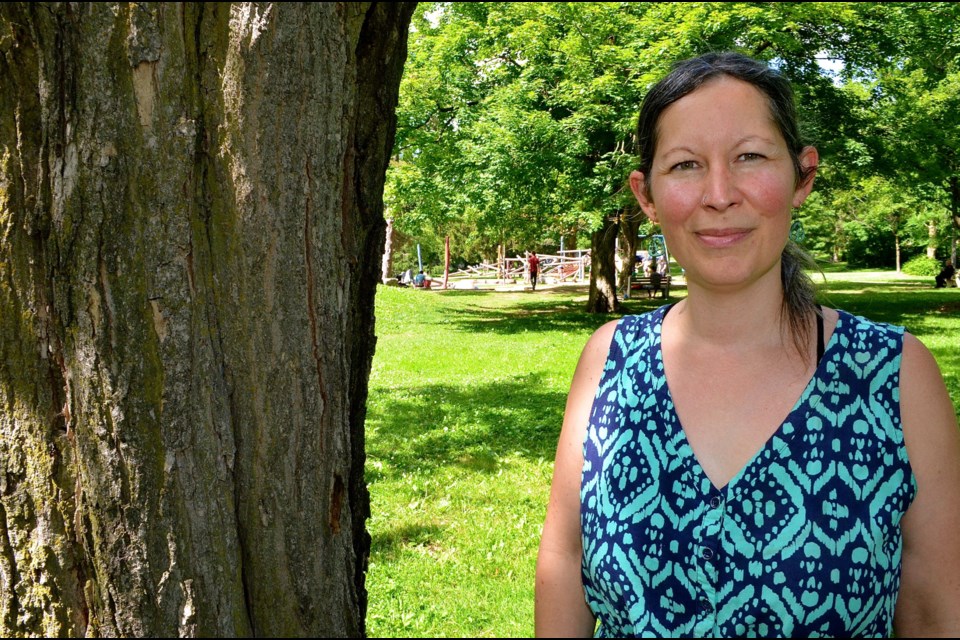When GuelphToday first featured Shawna Percy in November 2017 she was presenting a series of workshops at 10C that focused on Assessing for Suicide in Kids (ASK).
She said that talking to children who have lost a loved one to suicide has its risks but so does not talking to them about it.
“In that article I said that we don’t talk to them about means,” said Percy. “I had said that we should be frank with kids when we talk about death and we should define death so that it means the person is no longer breathing, that they aren’t playing, they’re not eating. So, it has a very specific definition to it.”
She has since revised her advice about discussing means if the child asks about it.
“We shouldn’t be talking about it publicly because that can take away a protective factor but, in our families, we should be talking about it but talking about it thoughtfully and exploring why the child wants to know,” she said.
A child’s curiousity about how their loved one committed suicide could be an indicater that the child is at risk.
“One of the things that is different from children suiciding than adults is that children and even younger teens don’t understand the permanence of their actions,” said Percy. “They watch video games or read fairy tales where people die and they come back. They are told that Grandma has died and gone to live in heaven. ‘Well I am going to die to visit grandma in heaven’, not understanding that they won’t come back the next day.”
Percy understands fully the impact and permanence of suicide.
“My first husband died by suicide eight years ago,” she said. “My daughter was two years old at the time. I have personally lived with thoughts of suicide myself, not all the time but from time to time. It was before his death and it has been after from the trauma of it. It is part of the human experience for many, many people. It is part of our body and our brain’s way of saying ‘pay attention, something needs to change here.’ Not that you need to suicide but something needs to change.”
In November of 2018 Percy opened the The Life Voice Centre on Woolwich Street where she continues to hold ASK workshops and others such as ASIST (Acquired Suicide Intervention Skills Training) as well as suicide interventions.
“When people discover programs like ASIST or Mental Health First Aid it is hopeful for them to know they can learn some evidence based skills for the next time they are in that position,” she said “My hope is that we can try to capture people proactively before they are ever in that position.”
She also rents space to community groups.
“We have other people there doing events and that might be scrapbooking or a writing club,” she said. “One of the most heartbreaking things about suicide is that people often isolate themselves and feel like they can’t connect and can’t be authentic. So, any opportunity we have to break that down and create connection or foster that then we are building resiliency in our community.”
Life Voice has partnered with the newly opened Nightingale Centre on Norfolk Street that provides grief counselling to children, youth and families.
“We have partnered with them specifically for suicide bereavement group,” said Percy.
“We all start by having a meal together – just this communal time and it is amazing how conversations change over food. After the meal the parents go off on their own and I facilitate a peer led support group for the parents and the kids go off with their own facilitator and they are able to connect with other kids who have identifiable situations with them.”
Percy sees more opportunities for collaboration.
“Art Not Shame is another organisation that has happened with,” she said. “The University of Guelph are great partners too. It is all very hopeful.”
Percy said the goal is to help people who are thinking about suicide find healthy coping tools because even though everyone’s story is unique, they all share elements of loss and pain.
“We deal with pain in one of four ways,” she said. “We will either try to avoid our pain, which can look like substance abuse or we will express our pain and that can look like someone talking about suicide a lot.”
The last two ways can be misleading to the untrained eye.
“We will find a solution to our pain and this is where relief and almost a happiness can come over a person and then they suicide,” she said. “It’s not that they want to suicide. It’s that they’re seeing suicide as an answer to the pain they’re in. The fourth one is people trying to put their pain on other people. We can’t live in pain forever and if we don’t know how to deal with it we will use one of those four ways if we haven’t found a healthier coping tool.”
To learn more about Life Voice visit www.lifevoice.ca


